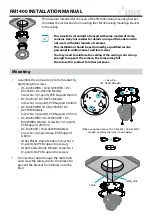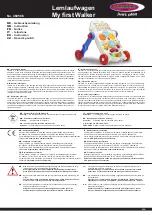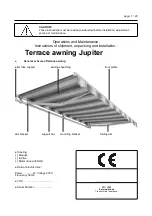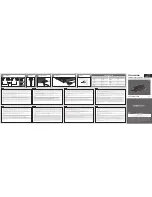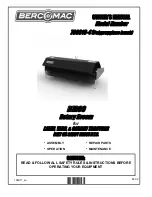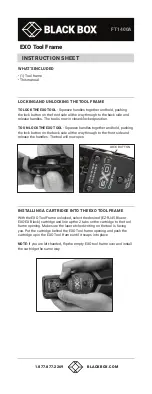
ATTENZIONE!
Con le ruote Campagnolo in composito utilizzate solo questi speciali
pattini freno rossi. Non utilizzate questi pattini con alcuna altra ruota.
L’utilizzo di qualsiasi altra combinazione pattini-cerchio potrebbe
risultare in una frenata insufficiente e/o irregolare ed essere causa di
incidenti, lesioni fisiche o morte.
L’uso di pattini freno diversi da quelli specificati potrebbe inoltre
danneggiare seriamente il cerchio. Vi raccomandiamo di controllare
sempre la compatibilità pattino-cerchio indicata sulla confezione dei
pattini.
F
1
WEAR LIMIT
3
4
~1 mm
~1 mm
• Se siete in possesso di freni Campagnolo con vite di bloccaggio,
seguite le seguenti istruzioni:
• Per la sostituzione dei pattini, rimuovete la vite presente sul portapat-
tini (F - Fig. 1), utilizzando una chiave a brugola da 2 mm, sfilate il pattino
usurato (Fig. 1) e sostituitelo con uno nuovo.
• Inserite il nuovo pattino, verificando che la freccia di avanzamento
della ruota presente sul pattino, sia nella direzione effettiva di avanza-
mento della ruota.
• Verificate che la sede (G - Fig. 2) della vite del pattino sia nella posi-
zione corrispondente alla vite di bloccaggio presente sul portapattino
(Fig. 2).
PERICOLO!
Avvitate completamente la vite presente sul portapattini, utilizzando
una chiave a brugola da 2 mm.
L'errato montaggio del portapattino può causare lo sfilamento del
pattino dal portapattino ed essere causa di incidenti, lesioni fisiche o
morte.
IMPORTANTE
Se siete in possesso di freni NON Campagnolo con vite di bloccaggio,
fate riferimento al Foglio Istruzioni fornito dal produttore dei freni.
• Verificate periodicamente lo stato di usura dei pattini e sostituiteli quan-
do la superficie frenante è in prossimità della fine della scanalatura con-
trassegnata dalla scritta "WEAR LIMIT" o in caso la loro potenza frenante
risulti insufficiente (Fig. 3).
• Verificate periodicamente che la vite di serraggio (F - Fig. 1) presente
sul portapattini, sia completamente avvitata.
• Per mantenere sempre efficienti i pattini e non usurare i fianchi dei
cerchi, vi consigliamo di controllare costantemente e di asportare im-
mediatamente con un una lima eventuali corpi estranei che possono de-
positarsi sui pattini stessi.
• Ricordate che l’uso della bicicletta sul bagnato comporta una notevo-
le riduzione sia del potere frenante dei pattini sia dell’aderenza al suolo
delle gomme. Ciò rende più difficile il controllo e la frenata della bi-
cicletta. Al fine di evitare incidenti, si raccomanda estrema attenzione
nell’uso della bicicletta sul bagnato.
- Verificate che la distanza dei pattini dal cerchio sia di circa 1 mm come
illustrato in figura 4.
- Se non rispettano questa distanza fate riferimento alle istruzioni del
vostro freno o fate riferimento al vostro meccanico di fiducia.
IMPORTANTE! Inserite il nuovo pattino, verificando che la freccia di avanzamento della ruota presente sul pat-
tino, sia nella direzione effettiva di avanzamento della ruota.
Individuate il pattino con l'indicazione "LEFT" per installarlo sul portapattino di SINISTRA e il pattino con l'indi-
cazione "RIGHT" per installarlo sul portapattino di DESTRA.
IMPORTANT! Insert the new block, ensuring that the wheel forward arrow on the block is in the actual direction
that the wheel spins.
Identify the block with the "LEFT" indication to install it on the LEFT HAND brake block holder and the block with
the "RIGHT" indication to install it on the RIGHT HAND brake block holder.
WICHTIG! Montieren Sie den Bremsschuh mit der Aufschrift „LEFT“ auf den LINKEN Bremsschuhhalter und den
Bremsschuh mit der Aufschrift „RIGHT“ auf den RECHTEN Bremsschuhhalter.
Montieren Sie den Bremsschuh mit der Aufschrift „LEFT“ auf den LINKEN Bremsschuhhalter und den
Bremsschuh mit der Aufschrift „RIGHT“ auf den RECHTEN Bremsschuhhalter.
F
G
2
WARNING!
Bicycles with composite Campagnolo wheels must only be fitted
with these special red brake blocks. Do not use these blocks on any
other wheel. Using any other brake block-rim combination may lead
to insufficient and/or unpredictable braking performance and cause
accidents, injuries or even death.
Using other brake blocks than the specified ones can seriously dama-
ge the rim. Always check the compatible brake block-wheel combina-
tions indicated on the packaging of the brake blocks.
• If you have Campagnolo brakes with locking screw, follow the
instructions below:
• To replace the brake blocks remove the screw on the brake block hol-
der (F - Fig. 1) using a 2 mm Allen wrench, remove the worn brake block
(Fig. 1) and replace it with a new one.
• Insert the new brake block, ensuring that the wheel direction arrow on
the brake block
is in the actual forward direction of the wheel.
• Ensure that the seat (G - Fig. 2) of the brake block screw is in the
position that corresponds to the locking screw on the brake block
holder
(Fig. 2).
DANGER!
Fully tighten the screw on the brake block holder using a 2 mm Allen
wrench.
Incorrect mounting of the brake block holder may cause the brake
block to slide out of the brake block holder and cause
accidents, physi-
cal injury or even death.
IMPORTANT
If you have NON Campagnolo brakes with locking screw, please consult
the instruction sheet supplied by the brakes manufacturer.
• Periodically check the state of wear of the brake blocks and replace
them when the braking surface approaches the end of the groove marked
"WEAR LIMIT", or in the case of inadequate braking performance (Fig. 3).
• Periodically check that the tightening screw (F - Fig. 1) on the brake
block holder is completely tightened.
• To keep the brake blocks working correctly and prevent wheel rim wear,
check the brake blocks continuously and, if necessary, use a file to im-
mediately remove any foreign objects found adhering to the surface of
the blocks themselves.
• Always bear in mind that riding the bicycle in wet conditions signifi-
cantly reduces the braking power of the brake blocks and tyre grip. This
makes the bicycle itself more difficult to control and stop safely. Always
ride with extreme caution in the wet to prevent the risk of accidents.
• Ensure that the distance of the pads from the wheel is about 1 mm
(Fig.4).
- If the gap is incorrect, adjust by referring to the instructions for your
braking system or take the bicycle to your preferred mechanic.
ACHTUNG!
Mit den Campagnolo Laufrädern aus Verbundwerkstoff sollten
Sie ausschließlich diese speziellen roten Bremsschuhe benutzen.
Verwenden Sie diese Bremsschuhe mit keinem anderen Laufrad. Bei
Verwendung jeder anderen Bremsschuh-Felgen Kombination könnte
die Bremsung unzureichend und/oder unregelmäßig ausfallen und
dadurch Unfälle mit schweren oder sogar tödlichen Verletzungen
verursachen.
Der Gebrauch von anderen als den vorgeschriebenen Bremsschuhen
als den angegebenen könnte zudem zu schweren Schäden an der
Felge führen. Bitte kontrollieren Sie unbedingt immer die auf der
Packung mit den Bremsschuhen angegebene Kompatibilität zwischen
Bremsschuh und Felge.
• Wenn Sie Campagnolo-Bremsen mit Sicherungsschraube besitzen,
befolgen Sie die nachstehenden Anweisungen:
• Für den Austausch der Bremsbeläge die Schraube an der
Bremsbelaghalterung (F - Abb. 1) mit einem Inbusschlüssel zu 2 mm
entfernen, den verschlissenen Bremsbelag (Abb. 1) abziehen und durch
einen neuen ersetzen.
• Setzen Sie den neuen Bremsbelag ein und stellen Sie dabei sicher,
dass der Pfeil für die Drehrichtung des Rads auf dem Bremsbelag
tatsächlich der Drehrichtung des Rads in Vorwärtsfahrt entspricht.
• Stellen Sie sicher, dass sich die Aufnahme (G - Abb. 2) der Schraube
des Bremsbelags in der richtigen Position an der Arretierschraube an
der Bremsbelaghalterung befindet (Abb. 2).
GEFAHR!
Ziehen Sie die Schraube an der Bremsbelaghalterung mit einem
Inbusschlüssel zu 2 mm vollkommen an.
Eine falsche Montage der Bremsbelaghalterung kann dazu führen,
dass der Bremsbelag aus der Halterung rutscht, und so Unfälle,
Verletzungen oder den Tod verursachen.
WICHTIG
Wenn Ihre Bremsen NICHT die von Campagnolo mit Sicherungsschraube
sind, Bitte beachten Sie die Ihres Bremsen-Herstellers beigefügte
Bedienungs-anleitung.
• Prüfen Sie regelmäßig den Verschleißzustand der Bremsschuhe und
tauschen Sie sie aus, wenn sich die Bremsoberfläche nahe bei der mit
der Aufschrift "WEAR LIMIT" bezeichneten Nut befindet oder falls ihre
Bremskraft nicht mehr ausreichend ist (Abb. 3).
• Stellen Sie regelmäßig sicher, dass die Arretierschraube (F - Abb. 1) an
der Bremsbelaghalterung vollkommen angezogen ist.
• Um die Bremsschuhe immer einwandfrei funktionstüchtig zu erhal-
ten und die Felgenflanken nicht abzunutzen, empfehlen wir Ihnen, die
Bremsschuhe ständig auf Ablagerungen von Fremdkörpern zu kontrol-
lieren und diese ggf. sofort mit einer Feile zu entfernen.
• Wenn Sie Ihr Fahrrad bei nassen Straßenverhältnissen benutzen, soll-
ten Sie daran denken, dass die Bremsleistung der Bremsschuhe deutlich
reduziert ist und auch die Reifen wesentlich weniger auf dem Straßenbe-
lag haften. Dadurch wird es schwieriger für Sie, das Fahrrad zu kontrol-
lieren und zu bremsen. Um Unfälle zu vermeiden, sollten Sie daher das
Fahrrad auf nassem Untergrund mit äußerster Vorsicht benutzen.
- Stellen Sie sicher, dass der Abstand der Bremsbeläge von der Felge
zirka 1 mm beträgt (Abb.4).
- Wenn dieser Abstand nicht eingehalten wird, nehmen Sie auf die
Anweisungen Ihrer Bremse Bezug oder wenden Sie sich an den
Mechaniker Ihres Vertrauens.
W
ARNING!
cod.
7225734
- R
ev
.01 - 05/2022
© 2022 - Campagnolo S.r
.l.
IT
ALIANO
ENGLISH
DEUTSCH
BRAKE P
ADS
FOR
COMPO
SITE
WHEELS
BR-BO500X1



